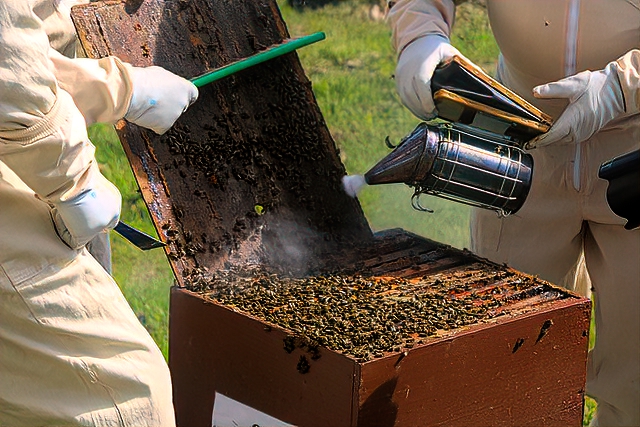
In this article, you will discover the fascinating world of beekeeping and uncover the answer to the burning question: how much do beekeepers make? Delve into the buzzing industry and explore the various factors that contribute to a beekeeper’s income. From the size of the apiary to the region’s climate, we will explore the range of earnings and the potential for honey-coated success. So put on your beekeeper’s suit, grab a jar of honey, and let’s venture into the world of beekeeping to uncover the sweet truth about their earnings.
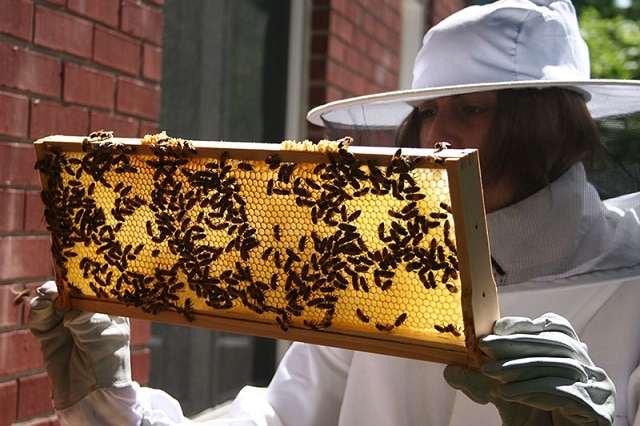
Salaries of Beekeepers
Beekeeping is not only a fascinating and rewarding hobby but can also be a profitable profession. The income of beekeepers can vary widely depending on various factors. In this article, we will explore the factors affecting beekeepers’ salaries, average salary ranges, regional variations in salaries, employment benefits, and annual income growth.
Factors Affecting Beekeepers’ Salaries
Several factors influence the salaries of beekeepers. Some of these factors include the beekeeper’s experience, the number of hives they manage, geographical location, market demand, and the quality of the honey they produce. Each of these factors plays a crucial role in determining how much a beekeeper can earn.
Average Salary Range
The average salary range for beekeepers can vary significantly based on different factors. According to recent studies, beekeepers in the United States earn an average salary ranging from $30,000 to $70,000 per year. However, it’s important to note that this range can be higher or lower depending on the factors mentioned earlier.
Regional Variations in Salaries
Salaries for beekeepers can also vary significantly by region. For example, beekeepers in regions with a higher demand for bee products or a favorable climate for beekeeping may have higher earning potential. On the other hand, regions with less demand or unfavorable weather conditions might offer lower salaries. It is essential for beekeepers to consider regional variations before establishing their apiaries.
Employment Benefits
While the beekeeping profession may not come with traditional employment benefits such as health insurance or retirement plans, there are other forms of compensation that beekeepers can enjoy. These benefits may include flexibility in working hours, the ability to work outdoors, and the opportunity to make a positive impact on the environment by promoting pollination and biodiversity.
Annual Income Growth
The income of beekeepers is not stagnant and can grow over time. With experience and a strong reputation, beekeepers have the potential to increase their income. As they expand their knowledge, develop efficient practices, and establish strong relationships with customers, they can enjoy higher demand for their products and services, leading to a growth in their annual income.
Income Sources for Beekeepers
Beekeepers have various sources of income that contribute to their overall earnings. Understanding these income sources is essential for beekeepers to maximize their earning potential. Here are the primary sources of income for beekeepers:
Honey Production
Honey production is the most well-known and common source of income for beekeepers. Beekeepers collect honey from their hives and sell it either directly to consumers, local stores, or wholesale buyers. The quality and quantity of honey produced can greatly impact the profitability of beekeepers.
Pollination Services
Beekeepers also provide pollination services to farmers and orchard owners. Honey bees play a vital role in pollinating crops, increasing their yield and quality. Beekeepers rent out their hives to farmers during the pollination season, receiving payment for the service they provide. This source of income can be lucrative, especially in areas with a high demand for pollination services.
Bee Sales
Beekeepers can generate income by selling bees to other beekeepers or individuals looking to start their own hives. These sales can include both full colonies and nucleus colonies, which are smaller colonies used for hive expansion. Selling bees can be a profitable endeavor, particularly for experienced beekeepers who have healthy and well-maintained colonies.
Beeswax and Propolis
Beeswax and propolis, which are derived from beekeeping operations, can be sold as additional sources of income. Beeswax is a versatile substance used in various industries, including cosmetics, pharmaceuticals, and candle making. Propolis, known for its medicinal properties, is also in high demand. Beekeepers can capitalize on the value of these bee products to supplement their earnings.
Value-Added Products
Beekeepers can create value-added products using honey and other bee-related materials. These products can range from honey-infused skincare items to beeswax candles and gourmet honey-based foods. Offering value-added products allows beekeepers to cater to a niche market and potentially command higher prices, increasing their overall income.
Determining Factors for Beekeeping Income
The income of beekeepers is determined by various factors that directly impact their earning potential. Here are the key factors that beekeepers should consider:
Beekeeper’s Experience
Experience plays a crucial role in determining a beekeeper’s income. Experienced beekeepers often have a higher demand for their products and services due to their established reputation and knowledge. They are more likely to produce high-quality honey and maintain healthy colonies, increasing their ability to attract customers and negotiate higher prices.
Number of Hives
The number of hives a beekeeper manages directly influences their income. Beekeepers with larger apiaries have greater honey production capacity, allowing them to sell larger quantities of honey. Additionally, more hives can lead to increased opportunities for renting colonies for pollination services, resulting in higher earnings.
Geographical Location
Geographical location significantly impacts the income potential of beekeepers. Areas with a favorable climate for bees and high demand for bee products often offer more opportunities for beekeepers to generate income. Additionally, being located near farmers or orchard owners who require pollination services can greatly contribute to a beekeeper’s earnings.
Market Demand
The demand for bee products, such as honey and beeswax, plays a critical role in a beekeeper’s income. Beekeepers located in areas with a high demand for local, organic, or specialty honey may be able to charge premium prices for their products. Identifying and catering to niche markets can be a successful strategy for beekeepers to increase their income.
Quality of Honey
The quality of the honey produced by beekeepers can impact their income. Honey with unique flavors, organic certifications, or specific regional characteristics can command higher prices in the market. Beekeepers who focus on producing high-quality honey through careful hive management and sustainable practices have a competitive advantage, allowing them to charge premium prices.
Expenses and Costs in Beekeeping
While beekeeping can be a profitable endeavor, it also entails various expenses and costs that beekeepers need to consider. Understanding these costs is crucial for beekeepers to effectively manage their finances and ensure profitability. Here are the primary expenses and costs in beekeeping:
Initial Investment
Starting a beekeeping operation requires an initial investment in essential equipment and supplies. This includes purchasing beehives, protective clothing, and beekeeping tools such as smoke cans and hive tools. The initial investment can vary depending on the scale of the operation and the quality of equipment chosen.
Hive Maintenance Costs
Maintaining beehives involves ongoing costs such as feeding bees during times of scarcity, preventing diseases and pests, and periodic hive inspections. Hive maintenance costs can include expenses for feeding supplements, medications, pest control treatments, and replacement of worn-out hive components. These costs are essential for maintaining healthy colonies and ensuring productivity.
Beekeeping Equipment
Beekeepers need to invest in various equipment and tools to effectively manage their hives. This includes items such as honey extractors, uncapping knives, pollen traps, and bee brushes. The cost of this equipment depends on the quality, type, and brand chosen. Upgrading equipment over time can improve productivity and efficiency but adds to the overall costs.
Labor Costs
Labour costs can be a significant expense in commercial beekeeping operations. Beekeepers may need to hire additional help during busy periods such as honey extraction or pollination season. The number of colonies managed and the scale of operations influence the labor requirements and associated costs. Hiring knowledgeable and skilled labor can contribute to the success and profitability of the beekeeping business.
Healthcare for Bees
Maintaining the health and well-being of bees is essential for a successful beekeeping operation. This includes providing nutritional supplements, treating diseases and pests, and managing hive ventilation. Healthcare costs can include expenses for medications, supplements, testing services, and specialized beekeeping treatments. Prioritizing bee health not only ensures productivity but also contributes to the longevity and success of the business.
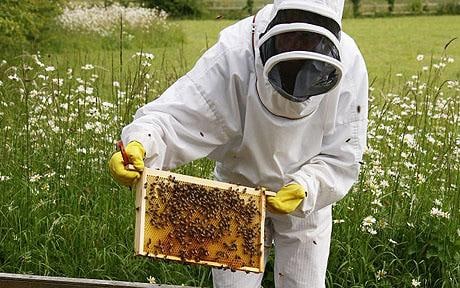
Additional Revenue Streams for Beekeepers
Beekeepers can explore additional revenue streams to augment their earnings and diversify their income sources. These additional revenue streams not only provide opportunities for increased profitability but can also enhance the overall value of the beekeeping business. Here are some potential additional revenue streams for beekeepers:
Beekeeping Education
Beekeepers can offer educational programs, workshops, or classes to individuals interested in beekeeping. Sharing knowledge and expertise through teaching can generate income while also fostering a sense of community among beekeepers. Offering educational resources, mentorship, and online courses are additional avenues to facilitate the learning process and generate revenue.
Selling Beekeeping Supplies
Beekeepers can consider selling beekeeping supplies and equipment to other beekeepers. This includes items such as beehives, frames, protective clothing, tools, and beekeeping books. By becoming a supplier, beekeepers can leverage their expertise and established networks to generate additional income.
Apiary Tours and Farm Visits
Beekeepers can offer guided tours and visits to their apiaries, providing individuals and groups with an opportunity to learn about bees, honey production, and the role of pollination. Charging a fee for these tours can generate income while raising awareness about the importance of bees and environmental conservation.
Beekeeping Workshops and Classes
In addition to beekeeping education, beekeepers can organize specialized workshops or classes on topics like queen rearing, honey extraction, or beeswax candle making. These interactive sessions can attract individuals seeking hands-on learning experiences and generate revenue for the beekeeper.
Bee Consultations
Experienced beekeepers can offer consulting services to novice beekeepers, farmers, or businesses interested in establishing or enhancing their beekeeping operations. Consulting services can involve providing advice, hive inspections, disease diagnosis, and personalized recommendations. Bee consultations can be billed on an hourly or per-project basis, creating an additional income stream.
Support and Grants for Beekeepers
Beekeepers have access to various support systems and grants that can assist in the development and growth of their businesses. These resources provide financial aid, mentorship, and guidance to beekeepers, ensuring their long-term success. Here are some support avenues for beekeepers:
Government Funding
Government organizations often offer programs and grants to support beekeeping initiatives, research, and hive management practices. Beekeepers can explore options such as agricultural grants, rural development funds, or environmental conservation subsidies. These funding opportunities can provide financial assistance for equipment purchases, capacity building, or infrastructure development.
Non-Profit Organizations
Non-profit organizations dedicated to the promotion of beekeeping and environmental conservation often provide support to beekeepers. These organizations may offer grants, educational resources, training programs, and networking opportunities. Collaborating with non-profit organizations can help beekeepers access valuable resources and expertise.
Beekeeping Associations
Beekeeping associations play a crucial role in supporting and advocating for beekeepers. They provide educational resources, mentorship opportunities, networking events, and access to industry information. Membership in beekeeping associations can grant beekeepers access to grants, workshops, and other educational programs that enhance their skills and profitability.
Research Grants
Universities, research institutions, and government bodies often provide research grants to support studies related to bees, pollination, and bee health. Beekeepers with sound research proposals can apply for these grants and contribute to the scientific understanding of beekeeping. Research grants not only provide financial support but also help beekeepers in developing innovative practices and approaches.
Farmers’ Market Programs
Participating in farmers’ markets can be a lucrative opportunity for beekeepers to sell their honey, beeswax, and other value-added products directly to consumers. Many farmers’ market programs offer assistance to beekeepers, including reduced fees for stalls, marketing support, and access to a broad customer base.
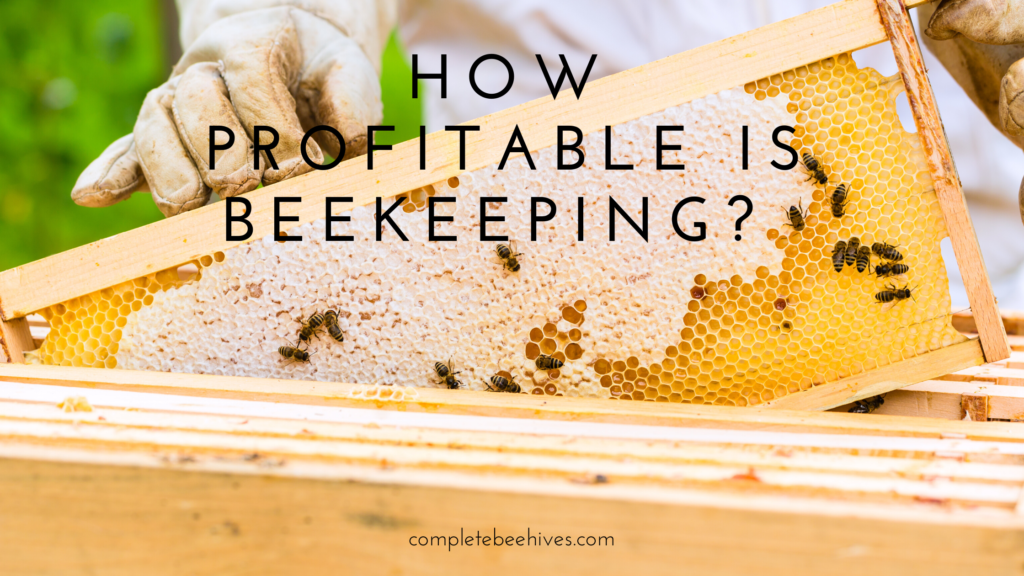
Success Stories of Beekeeping Entrepreneurs
The beekeeping industry boasts numerous success stories of entrepreneurs who have turned their passion for beekeeping into thriving businesses. These success stories provide inspiration and insight into the strategies and actions that lead to success. Here are some common themes found in the success stories of beekeeping entrepreneurs:
Building a Sustainable Beekeeping Business
Successful beekeeping entrepreneurs prioritize the sustainability of their operations. They adopt environmentally friendly practices, focus on the health and welfare of their bees, and manage their resources efficiently. By prioritizing sustainability, these entrepreneurs not only contribute to a healthier ecosystem but also establish a strong foundation for long-term profitability.
Entrepreneurial Strategies
Entrepreneurial strategies such as identifying niche markets, establishing a strong brand, and leveraging digital marketing are common among successful beekeepers. They differentiate themselves from the competition by offering unique products, creating engaging marketing campaigns, and building a loyal customer base.
Collaborations and Partnerships
Successful beekeepers understand the value of collaborations and partnerships. They forge relationships with local farmers, businesses, and fellow beekeepers to expand their market reach and create mutually beneficial opportunities. Collaborations can include joint marketing efforts, shared resources, or even co-branding initiatives.
Expanding Market Reach
Successful beekeeping entrepreneurs actively seek opportunities to expand their market reach. This can involve partnering with wholesalers, supplying to local stores, or even exporting their products internationally. They invest in developing distribution networks, attending trade shows, and staying updated on market trends to capitalize on growth opportunities.
Diversifying Product Line
Entrepreneurs in beekeeping recognize the importance of diversifying their product line. They explore value-added products beyond honey, such as beeswax candles, honey-based skincare, or mead production. By offering a diverse range of products, they cater to different customer preferences and ensure a consistent flow of income throughout the year.
Challenges and Risks in Beekeeping
While beekeeping offers opportunities for profitability, there are also various challenges and risks that beekeepers must navigate. Understanding and addressing these challenges is essential for sustained success in the industry. Here are some of the key challenges and risks in beekeeping:
Climate Change Effects
Climate change poses significant challenges to beekeeping. Changes in temperature, rainfall patterns, and extreme weather events can impact flowering cycles, reducing nectar availability for bees. This can lead to decreased honey production and affect the overall health of bee colonies. Beekeepers need to adapt their practices to mitigate the effects of climate change and ensure the well-being of their bees.
Diseases and Pests
Diseases and pests, such as varroa mites, American foulbrood, and small hive beetles, can severely impact bee health and productivity. Beekeepers must implement effective disease management strategies, conduct regular hive inspections, and take prompt action to prevent and control infestations. Sustainable integrated pest management practices are essential for minimizing the risks associated with diseases and pests.
Environmental Factors
Environmental factors, such as pesticide use, habitat loss, and monoculture agriculture, can negatively impact bee health and forage availability. Beekeepers need to monitor the quality of forage areas, advocate for pesticide-free practices, and participate in habitat preservation initiatives. By proactively addressing environmental challenges, beekeepers can contribute to the well-being of their bees and the long-term sustainability of the industry.
Market Volatility
The beekeeping industry is subject to market volatility, with fluctuations in honey prices and demand. External factors, such as global honey production, import/export regulations, and consumer preferences, can impact the market. Beekeepers need to stay informed about market trends, diversify their product offerings, and establish strong customer relationships to navigate market volatility successfully.
Regulatory Compliance
Beekeepers must comply with local, regional, and national regulations related to beekeeping, honey production, and food safety. Compliance-related costs, such as licensing fees and inspections, can impact profitability. Beekeepers need to stay updated on regulatory requirements and invest in appropriate infrastructure and practices to ensure compliance.
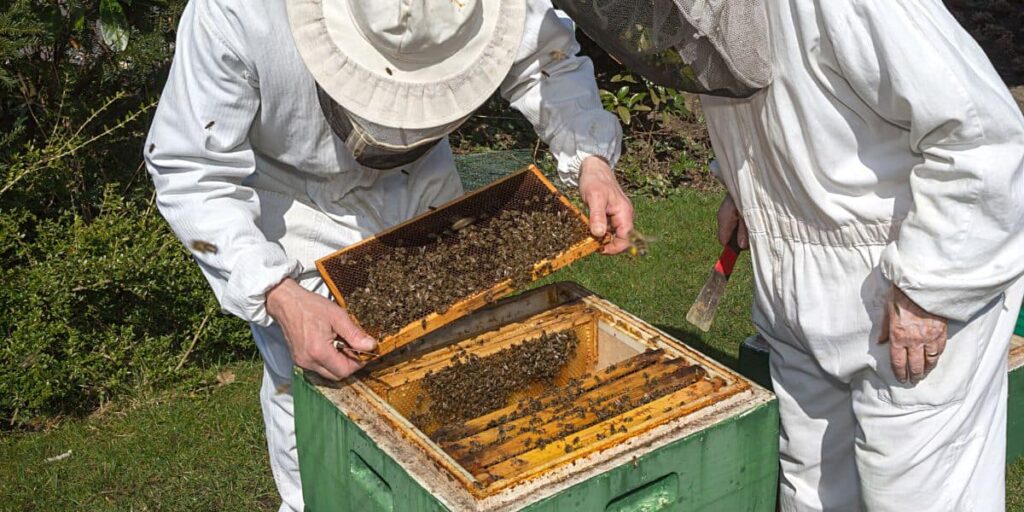
Opportunities in the Beekeeping Industry
While beekeeping presents its challenges, there are several exciting opportunities emerging within the industry. Beekeepers can tap into these opportunities to further enhance their success and contribute to the growth of the industry. Here are some key opportunities in the beekeeping industry:
Increasing Demand for Natural Honey
The growing consumer preference for natural and organic products presents a significant opportunity for beekeepers. With an increasing focus on health and sustainability, the demand for locally produced, natural honey is on the rise. Beekeepers can leverage this trend by focusing on sustainable beekeeping practices, highlighting the quality and traceability of their honey, and actively engaging with health-conscious consumers.
Growing Pollination Services Market
The expanding demand for pollination services provides beekeepers with an additional income stream. Pollination services are sought after by farmers and orchard owners to ensure the successful fertilization and yield of their crops. Beekeepers can capitalize on this demand by maintaining healthy hives, establishing strong relationships with agricultural producers, and offering competitive rates for their pollination services.
Rise of Organic Agriculture
The increasing popularity of organic agriculture creates opportunities for beekeepers. Organic farms rely on bees for pollination and often require organic-certified honey for various purposes. Beekeepers who embrace organic practices and obtain organic certifications can access a niche market, commanding premium prices for their honey and pollination services.
Alternative Bee Products
In addition to honey, beekeepers can explore alternative bee products that have gained popularity in recent years. These products include bee pollen, royal jelly, bee propolis, and bee venom. By diversifying their product offerings, beekeepers can cater to consumer demand for natural health products and capitalize on the potential of these alternative bee products.
Beekeeping Technology Innovations
Technology advancements are revolutionizing the beekeeping industry, providing opportunities for increased efficiency, productivity, and revenue. Innovations such as smart beehives, hive monitoring systems, and precision beekeeping tools can help beekeepers gain valuable insights, optimize hive management, and reduce labor costs. Embracing beekeeping technology can give beekeepers a competitive edge in ensuring profitability and sustainability.
Conclusion
Beekeeping can provide a fulfilling and financially rewarding career. While there are challenges and risks associated with the industry, beekeepers have numerous opportunities to succeed and thrive. By considering the factors that affect beekeepers’ salaries, diversifying income sources, understanding the determining factors for beekeeping income, managing expenses, and exploring additional revenue streams, beekeepers can navigate the industry with confidence. With the potential for varied income levels, the importance of business strategies, and the promising future outlook for beekeepers, finding the balance between passion and profit is achievable in the world of beekeeping.
